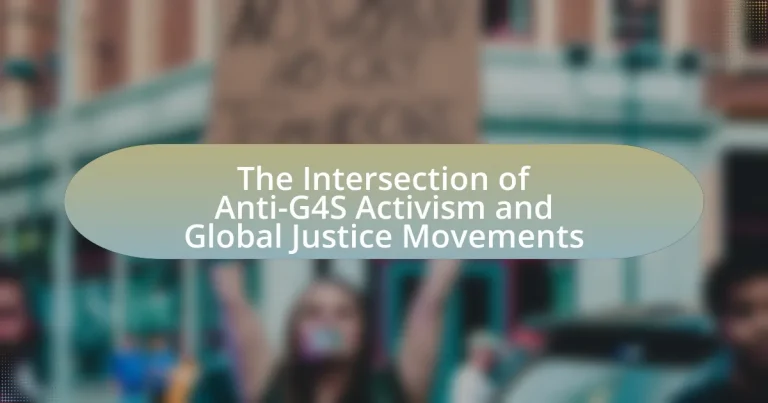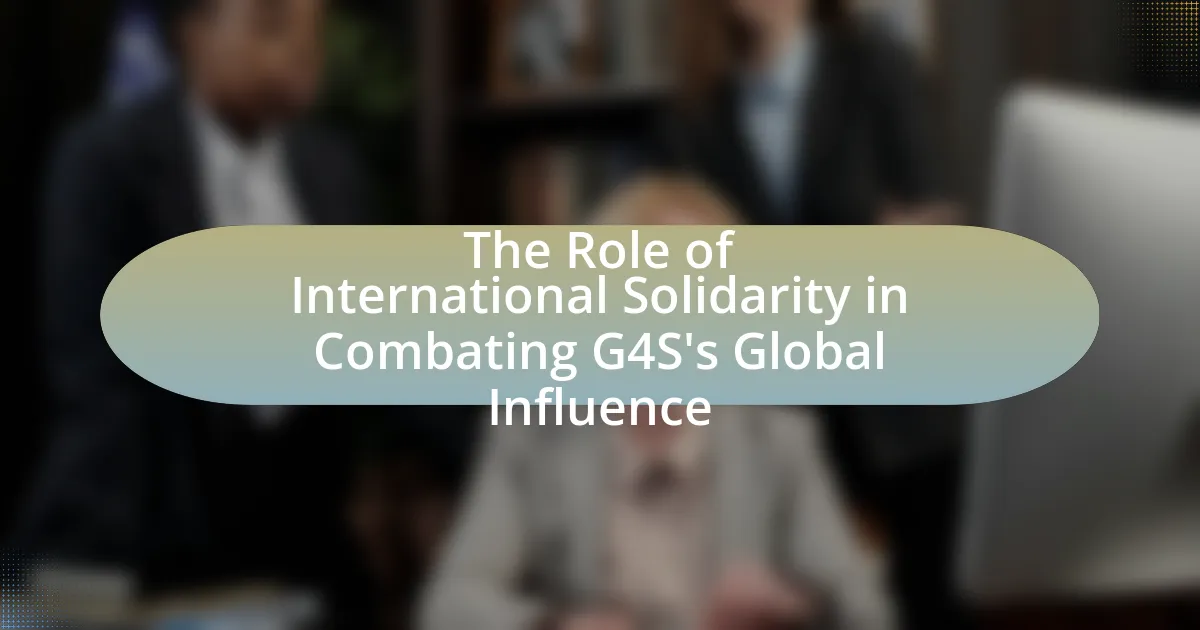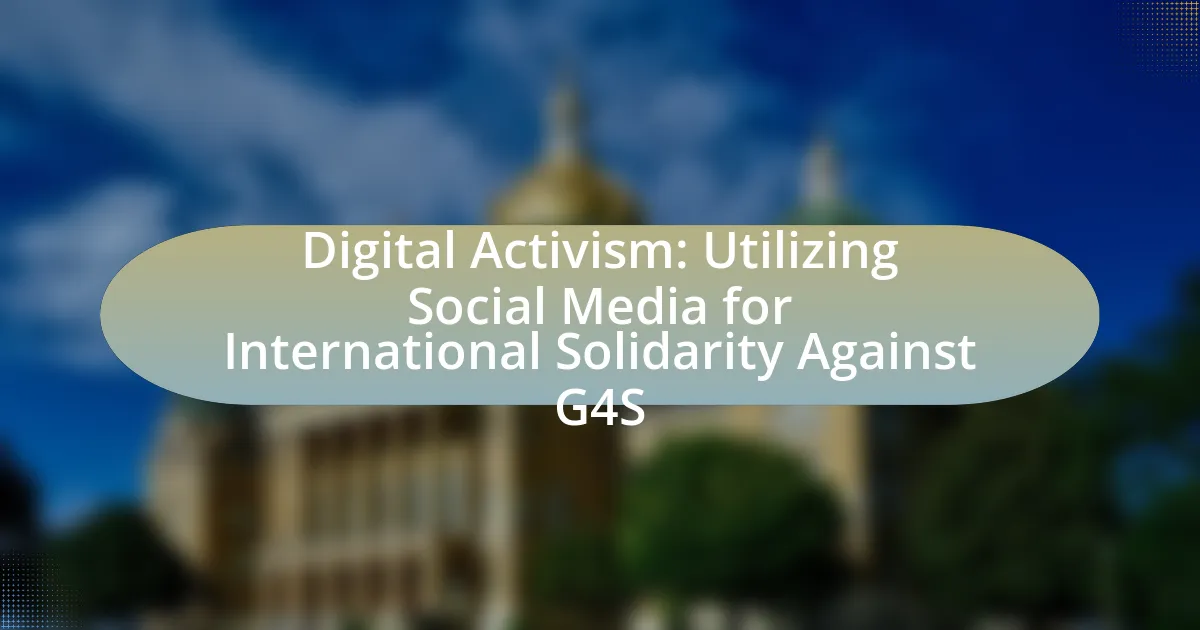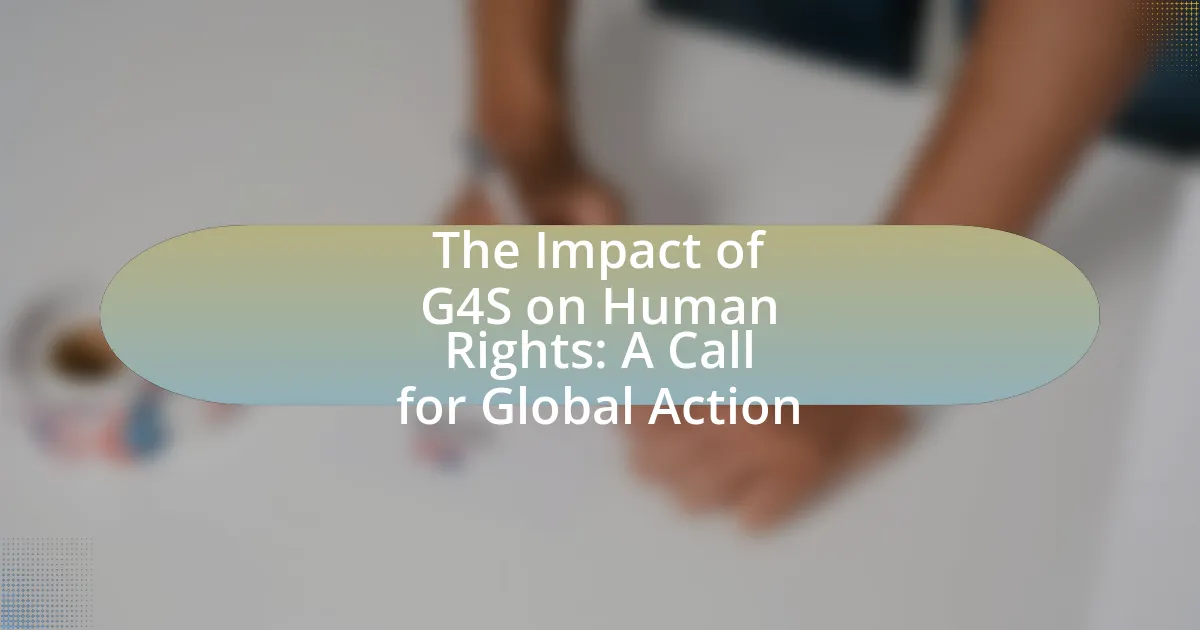The article examines the intersection of anti-G4S activism and global justice movements, highlighting their shared commitment to addressing human rights violations and promoting social justice. It details the historical context of anti-G4S activism, particularly its focus on the company’s controversial practices in the Israeli-Palestinian conflict and immigration enforcement. The article also explores the evolution of global justice movements, the significance of G4S in discussions of corporate accountability, and the strategies employed by activists to mobilize against the company. Additionally, it addresses the challenges faced by activists, the impact of collaboration between movements, and effective practices for raising awareness and engaging in activism.
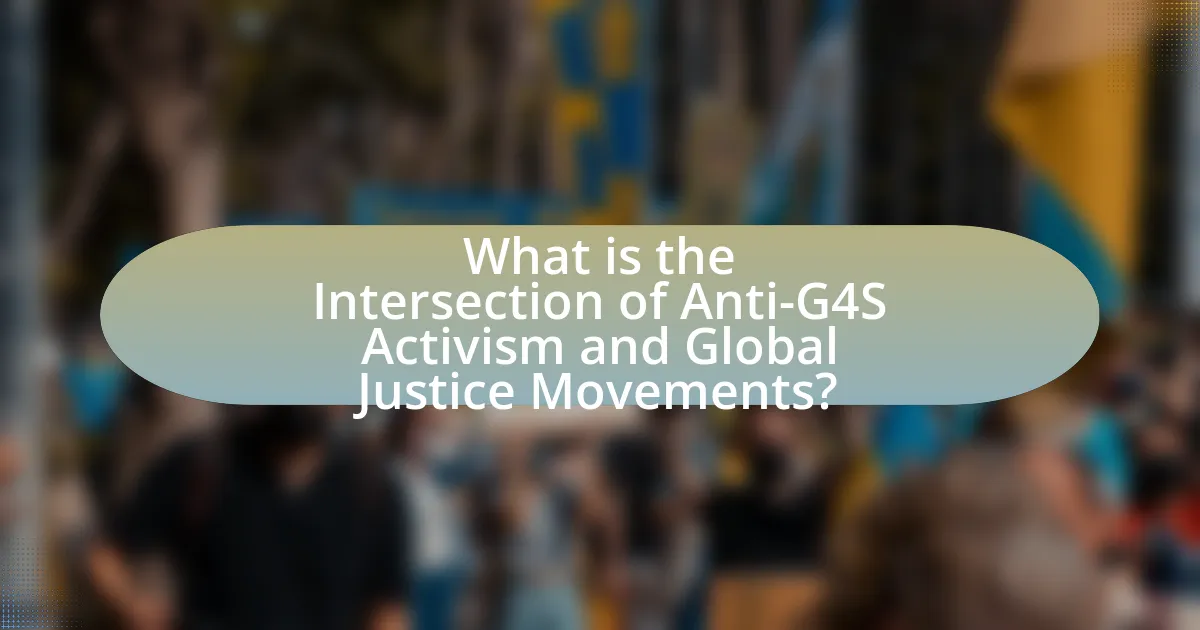
What is the Intersection of Anti-G4S Activism and Global Justice Movements?
The intersection of anti-G4S activism and global justice movements lies in their shared commitment to addressing human rights violations and promoting social justice. Anti-G4S activism specifically targets the practices of G4S, a private security company implicated in facilitating state violence and oppression, particularly in contexts such as the Israeli-Palestinian conflict and immigration enforcement. Global justice movements, which advocate for equitable social, economic, and political systems, align with these anti-G4S efforts by highlighting the role of corporations in perpetuating inequality and injustice. For instance, campaigns against G4S have been supported by various global justice organizations, emphasizing the need for accountability and ethical practices in security and policing. This synergy amplifies the call for systemic change, as both movements seek to dismantle oppressive structures and promote human dignity on a global scale.
How do Anti-G4S Activism and Global Justice Movements relate to each other?
Anti-G4S activism and global justice movements are interconnected through their shared goals of promoting human rights and challenging corporate complicity in systemic injustices. Anti-G4S activism specifically targets the practices of G4S, a private security company criticized for its involvement in human rights violations, particularly in conflict zones and occupied territories. Global justice movements, which advocate for equitable social, economic, and environmental systems, often align with anti-G4S efforts by highlighting the broader implications of corporate actions on marginalized communities. For instance, campaigns against G4S have been supported by global justice organizations that emphasize the need for accountability and ethical practices in business operations, demonstrating a collaborative effort to address issues like militarization and privatization of public services. This relationship is evidenced by joint protests, shared resources, and coordinated advocacy efforts that amplify the message of both movements, ultimately striving for a more just and equitable world.
What are the historical contexts of Anti-G4S Activism?
Anti-G4S activism has historical contexts rooted in the company’s involvement in controversial practices, particularly in relation to the Israeli-Palestinian conflict and its role in private security and detention services. The activism gained momentum in the early 2000s as G4S was criticized for providing security services to Israeli settlements and prisons, which activists argue contribute to human rights violations against Palestinians. This activism is part of a broader global justice movement that seeks to address issues of corporate accountability, militarization, and the privatization of public services. Notably, the Boycott, Divestment, Sanctions (BDS) movement, launched in 2005, specifically targets companies like G4S for their complicity in the occupation, further embedding anti-G4S activism within a larger framework of resistance against perceived injustices worldwide.
How have Global Justice Movements evolved over time?
Global Justice Movements have evolved from localized efforts addressing specific injustices to a more interconnected global framework advocating for systemic change across various issues. Initially, these movements focused on anti-colonial struggles and labor rights in the mid-20th century, exemplified by the civil rights movement in the United States and decolonization efforts in Africa and Asia. Over time, particularly from the late 1990s onward, the rise of globalization prompted a shift towards transnational activism, as seen in the protests against the World Trade Organization in Seattle in 1999, which united diverse groups under a common goal of challenging neoliberal policies. This evolution has been marked by the incorporation of technology and social media, enabling broader participation and mobilization, as evidenced by the Arab Spring and Occupy Wall Street movements. The current landscape reflects a convergence of issues, including climate justice, economic inequality, and human rights, demonstrating a more holistic approach to global justice.
Why is the role of G4S significant in global justice discussions?
The role of G4S is significant in global justice discussions due to its involvement in controversial security operations that raise ethical concerns. G4S, as one of the world’s largest security companies, has been criticized for its role in managing private prisons, immigration detention centers, and providing security for events linked to human rights violations. For instance, G4S has faced scrutiny for its contracts with the Israeli government regarding security in the West Bank, which activists argue contributes to the oppression of Palestinian people. This involvement positions G4S at the center of debates about corporate accountability, human rights, and the privatization of public services, making it a focal point for anti-G4S activism within broader global justice movements.
What services does G4S provide that impact global justice?
G4S provides security services, including prison management, transportation of detainees, and risk management, which impact global justice by influencing the treatment of individuals within the criminal justice system. These services are often criticized for their role in privatizing incarceration and contributing to systemic issues such as mass incarceration and human rights violations. For instance, G4S has been involved in managing facilities that have faced allegations of abuse and neglect, raising concerns about accountability and the ethical implications of privatized justice systems.
How does G4S’s involvement in various sectors influence activism?
G4S’s involvement in various sectors, including security, immigration, and prison services, significantly influences activism by drawing attention to human rights concerns and corporate accountability. Activists often target G4S due to its controversial contracts, such as those with governments for managing detention centers, which have been criticized for inhumane conditions. This scrutiny mobilizes global justice movements, as seen in campaigns that highlight G4S’s role in the Israeli occupation and its operations in the UK, where it has faced protests for its involvement in the privatization of public services. The company’s actions serve as a focal point for broader discussions on ethics in business practices, prompting increased activism aimed at holding corporations accountable for their social and environmental impacts.

What are the key strategies employed in Anti-G4S Activism?
Key strategies employed in Anti-G4S Activism include direct action, public awareness campaigns, and coalition-building. Direct action often involves protests and demonstrations aimed at disrupting G4S operations, highlighting the company’s involvement in controversial practices such as detention and surveillance. Public awareness campaigns utilize social media, educational events, and outreach to inform the public about G4S’s role in human rights violations, particularly in conflict zones. Coalition-building involves partnering with various organizations, including human rights groups and labor unions, to amplify the message and increase pressure on G4S through collective efforts. These strategies are supported by documented instances of G4S’s involvement in controversial activities, such as its contracts with governments for immigration detention centers and security services in conflict areas, which activists leverage to mobilize support and drive change.
How do activists mobilize against G4S?
Activists mobilize against G4S through coordinated campaigns, protests, and public awareness initiatives. These efforts often include organizing demonstrations at G4S facilities, leveraging social media to spread information about the company’s controversial practices, and collaborating with other organizations to amplify their message. For instance, groups like the Stop G4S campaign have highlighted G4S’s involvement in human rights abuses, particularly in relation to its contracts with governments and institutions linked to oppressive regimes. This mobilization is supported by documented evidence of G4S’s role in various global justice issues, such as its operations in Palestine and immigration detention centers, which activists use to inform and engage the public.
What types of campaigns are most effective in Anti-G4S Activism?
Direct action campaigns are the most effective in Anti-G4S Activism. These campaigns often include protests, boycotts, and public awareness initiatives that directly challenge G4S’s operations and practices. For instance, the Boycott, Divestment, Sanctions (BDS) movement has successfully mobilized support against G4S for its involvement in Israeli prisons and security services, leading to significant divestment from institutions that support the company. Additionally, grassroots organizing and coalition-building with other social justice movements amplify the impact of these campaigns, as seen in various protests that have garnered media attention and public support, thereby increasing pressure on G4S to change its practices.
How do social media and technology play a role in these campaigns?
Social media and technology are crucial in anti-G4S activism and global justice movements by facilitating rapid information dissemination and mobilizing supporters. Platforms like Twitter and Facebook enable activists to share real-time updates, organize protests, and amplify their messages to a global audience. For instance, the hashtag #BoycottG4S gained traction on social media, leading to increased awareness and participation in campaigns against the company. Additionally, technology tools such as live streaming and online petitions enhance engagement and allow for broader participation, as seen in various campaigns that have successfully leveraged these tools to gather support and influence public opinion.
What challenges do Anti-G4S activists face?
Anti-G4S activists face significant challenges, including legal repercussions, public backlash, and resource limitations. Legal repercussions arise from protests and direct actions against G4S, which can lead to arrests and charges, as seen in various countries where activists have been detained for civil disobedience. Public backlash often manifests in negative media portrayals and social stigma, complicating efforts to gain broader support for their cause. Additionally, resource limitations hinder their ability to mobilize effectively, as many activists operate on tight budgets and rely on volunteer efforts, which can restrict their outreach and impact. These challenges collectively impede the effectiveness of Anti-G4S activism within the broader context of global justice movements.
How do legal and political barriers impact activism?
Legal and political barriers significantly hinder activism by restricting the ability of individuals and groups to organize, express dissent, and mobilize for change. These barriers can manifest as restrictive laws, such as anti-protest legislation, which criminalizes peaceful demonstrations, or as political repression, where governments use surveillance and intimidation to stifle dissent. For instance, in countries with authoritarian regimes, activists often face arrest, harassment, or violence, which discourages participation and limits the effectiveness of movements. Furthermore, legal frameworks that limit funding for activist organizations can undermine their operational capacity, as seen in various jurisdictions where foreign funding for NGOs is heavily regulated or banned. These barriers create an environment where activism is not only challenging but also dangerous, ultimately impeding the progress of social justice movements.
What are the risks associated with protesting against G4S?
Protesting against G4S carries several risks, including legal repercussions, potential violence, and reputational damage. Legal repercussions may arise from arrests or charges related to public disorder, as G4S has a history of engaging law enforcement to manage protests. Additionally, protesters may face violence from counter-protesters or security personnel, as seen in various incidents where confrontations escalated. Reputational damage can occur for individuals or organizations involved, as G4S is a large multinational corporation with significant resources to counteract negative publicity. These risks highlight the complexities and dangers associated with activism against G4S within the broader context of global justice movements.
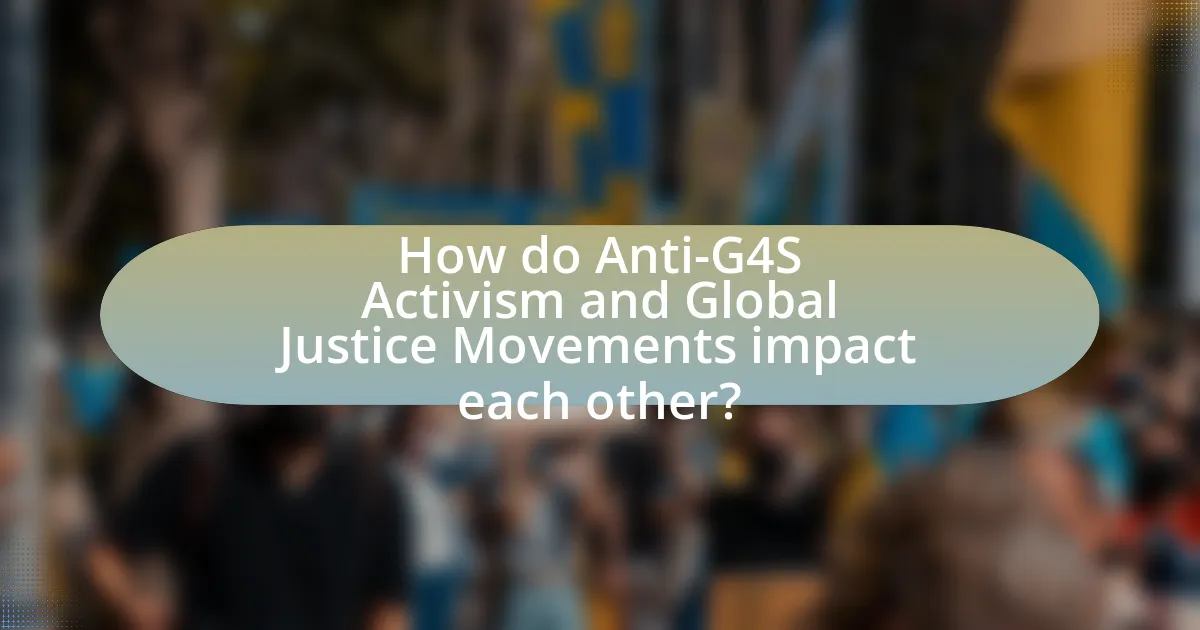
How do Anti-G4S Activism and Global Justice Movements impact each other?
Anti-G4S activism and global justice movements significantly influence each other by aligning their goals of social justice and human rights. Anti-G4S activism, which opposes the practices of the private security company G4S due to its involvement in controversial activities such as the Israeli occupation of Palestine, often collaborates with global justice movements that seek to address systemic inequalities and advocate for marginalized communities. This collaboration amplifies the visibility of both movements, as seen in campaigns that highlight the intersection of corporate accountability and human rights violations. For instance, the Boycott, Divestment, Sanctions (BDS) movement against Israel has gained traction through partnerships with global justice organizations, demonstrating how anti-G4S activism can enhance the reach and impact of broader social justice initiatives.
What are the outcomes of collaboration between these movements?
Collaboration between anti-G4S activism and global justice movements leads to increased visibility and impact of social justice issues. This partnership amplifies the voices of marginalized communities affected by G4S’s operations, fostering a unified front against corporate practices that violate human rights. For instance, joint campaigns have successfully pressured institutions to divest from G4S, resulting in significant financial losses for the company. Additionally, collaborative efforts have facilitated knowledge sharing and strategic planning, enhancing the effectiveness of grassroots mobilization. These outcomes demonstrate the power of solidarity in challenging systemic injustices and promoting accountability in corporate practices.
How does shared knowledge enhance activism strategies?
Shared knowledge enhances activism strategies by facilitating collaboration, increasing awareness, and improving the effectiveness of campaigns. When activists share information, they can coordinate efforts, align goals, and leverage diverse skills and resources, leading to more impactful actions. For instance, the sharing of data on human rights violations by organizations like Amnesty International has empowered grassroots movements to mobilize support and create targeted campaigns. This collective intelligence not only amplifies the reach of individual efforts but also fosters a sense of community and solidarity among activists, which is crucial for sustaining long-term movements.
What successes have been achieved through joint efforts?
Joint efforts in anti-G4S activism and global justice movements have successfully led to increased awareness and policy changes regarding human rights violations. For instance, campaigns against G4S’s involvement in the Israeli prison system have resulted in several universities and institutions divesting from the company, reflecting a growing recognition of ethical investment practices. Additionally, collaborative actions have pressured governments to scrutinize and limit the use of private security firms in conflict zones, thereby promoting accountability and transparency in security operations. These successes demonstrate the effectiveness of unified activism in driving social and political change.
How can individuals contribute to the Anti-G4S movement?
Individuals can contribute to the Anti-G4S movement by participating in awareness campaigns, boycotting G4S services, and engaging in grassroots organizing. Awareness campaigns can include sharing information on social media about G4S’s involvement in controversial practices, such as operating in conflict zones or providing security for oppressive regimes. Boycotting G4S services, such as refusing to use their security services or products, directly impacts their business model. Grassroots organizing can involve joining local activist groups that focus on human rights and justice, thereby amplifying collective efforts against G4S’s operations. These actions are supported by various reports and studies highlighting G4S’s role in human rights violations, which provide a factual basis for the movement’s claims.
What are effective ways to raise awareness about G4S’s practices?
Effective ways to raise awareness about G4S’s practices include organizing public demonstrations, leveraging social media campaigns, and collaborating with advocacy groups. Public demonstrations can attract media attention and engage community members, highlighting specific issues related to G4S’s operations, such as human rights violations. Social media campaigns can disseminate information rapidly, utilizing hashtags and viral content to reach a broader audience, as evidenced by the success of campaigns like #BoycottG4S. Collaborating with advocacy groups, such as Amnesty International, can provide credibility and amplify messages, as these organizations often have established networks and resources to support awareness efforts.
How can grassroots organizing strengthen the movement?
Grassroots organizing can strengthen the movement by fostering community engagement and mobilizing individuals around shared goals. This approach empowers local activists to address specific issues relevant to their communities, creating a sense of ownership and responsibility. For example, grassroots movements have historically led to significant social changes, such as the Civil Rights Movement in the United States, where local organizing was crucial in challenging systemic injustices. Additionally, grassroots efforts often build networks of solidarity, enhancing collaboration across diverse groups, which amplifies the movement’s reach and impact. Research indicates that grassroots campaigns can increase participation rates and drive policy changes, demonstrating their effectiveness in strengthening movements.
What are the best practices for engaging in Anti-G4S Activism?
The best practices for engaging in Anti-G4S Activism include raising awareness through education, organizing community events, and leveraging social media for outreach. Educating the public about G4S’s involvement in controversial activities, such as privatized policing and security in conflict zones, fosters informed discussions. Organizing community events, such as protests or informational sessions, can mobilize support and create a collective voice against G4S’s practices. Utilizing social media platforms allows activists to share information rapidly, connect with like-minded individuals, and amplify their message, as evidenced by successful campaigns that have gained traction online, leading to increased public scrutiny of G4S.
